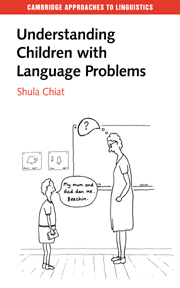Book contents
- Frontmatter
- Contents
- Acknowledgements
- Glossary of text conventions and symbols
- Introduction
- Part I Problems with words
- Part II Grappling with verb structure
- Part III Missing function morphemes
- Part IV Hidden meanings, baffling meanings
- 13 The roots of meaning
- 14 ‘[æ] you don't tell nobody this?’: strengths in pragmatic processing
- 15 ‘I can speak Chinese. But I can't speak Chinese’: problems in pragmatic processing
- Endpoint and springboard
- Further reading
- References
- Index
15 - ‘I can speak Chinese. But I can't speak Chinese’: problems in pragmatic processing
Published online by Cambridge University Press: 05 September 2012
- Frontmatter
- Contents
- Acknowledgements
- Glossary of text conventions and symbols
- Introduction
- Part I Problems with words
- Part II Grappling with verb structure
- Part III Missing function morphemes
- Part IV Hidden meanings, baffling meanings
- 13 The roots of meaning
- 14 ‘[æ] you don't tell nobody this?’: strengths in pragmatic processing
- 15 ‘I can speak Chinese. But I can't speak Chinese’: problems in pragmatic processing
- Endpoint and springboard
- Further reading
- References
- Index
Summary
The children presented in this chapter come out with language which is odd. But the oddness of these children's behaviours is not confined to language. They are all reported to have shown certain obsessive behaviours. All are observed to react to situations in unusual ways. Their play is very limited: when offered toy miniatures, they are likely only to reproduce scenarios they have seen, rather than constructing novel scenarios with the toys. When they talk, they commonly echo another person's utterance.
All of these behaviours suggest that their experience of the world and of other people is unusual. Since shared perspectives are fundamental to establishing meaning in language, we would expect them to attach unusual meanings to the language they hear, and to express odd meanings when they talk. It is not surprising, then, that they have all been found to perform well below their age level on tests of comprehension. They have also been very slow to produce language. When we home in on the language they produce, it proves quite odd.
Tony, who was observed between the ages of 3 and 7 in a study by Conti-Ramsden and Gunn (1986), showed all of these characteristics. Alongside these, he showed certain strengths. He was very good at tasks using visual materials. He successfully sorted, matched and sequenced items by size; recognised and matched numbers and symbols; copied patterns; and was able to do puzzles. Throughout the period of observation, his score on a test of nonverbal intelligence was consistently above average. Yet his use of language remained odd.
- Type
- Chapter
- Information
- Understanding Children with Language Problems , pp. 251 - 261Publisher: Cambridge University PressPrint publication year: 2000



